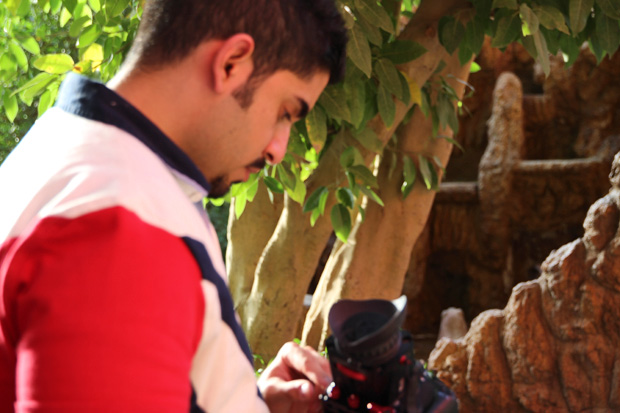
Abdulmohsen Al Hashem, one of Kuwait's youngest rising directors, first made waves when a video he made as a college project became one of the most admired videos in the country. That video, "Kuwait il3iz" became one of the most watched short films locally. Its popularity spread nationwide, first going viral, and then landing in movie theatres all across the country.
Khaleejesque spoke to Al Hashem about how he broke into the industry and his ever growing ambition. "As I see it, it’s better to aim for the stars and reach the moon than aiming for the clouds and reaching the roof," he says. We find out how…
What sparked your interest in directing?
After graduating high school just before turning 16, I had a hard time getting into flight schools both in the commercial and army sectors due to being underage. It wasn’t because I loved to fly, I actually hate planes, but I was afraid of living a daily routine job in an office behind a desk. Without much enthusiasm, college became the only way to go at the time.
First year at college I took this English class when I was considering it as a major. The professor gave us an assignment to write an essay about “Western media & its stereotyping of Arabs”. For our final presentation we had to use some form of medium and present our projects (through PowerPoint, music, magazines or videos).
I selected the latter since I just got a new Mac and was playing with some editing software that seemed simple enough. The result was tears and cheers from the entire class after the film was done, followed by students to whom I’d never talked to before walking me to my car expressing how much it moved them.
From there on I started to take video making seriously, first time in my life to do so with anything, and began learning and practicing as much as possible. Every single free moment I had would be filled with the A-Z’s of all technical sides to filmmaking, the history of the art. I still have a long way to go in learning, but enjoying the ride. It’s the kind of art that is never-ending, ever changing and almost infinite in its boundaries. And I loved if for those reasons.
How and when did you get your first big directorial break?
I would have to say the 2008 [Kuwait Parliament] elections. To this day I consider it THE most challenging experience of my life. Me and my friend, Rakan Al Otaibi, ventured out to make an advertisement fully on our own with the aim of seeing if we could compete in the real world. The result was 19 hour days for well over a month doing absolutely everything from filming, editing, copyrighting etc. Rakan financed everything for me and helped out where he could, especially with legal contracts.
I learned so much through that experience alone about the legal, creative and official side of filmmaking that no book, forum or word of mouth could ever teach. This gave us massive leverage and respect from clients when walking into meetings or marketing the ad. After completing it we marketed it to a client and it was immediately taken. The ad became the longest one in MP Marzouq Al Ghanim’s campaign. And I still have people talking to me about it every now and then.

What inspires you as a director? What do you like to represent in your films?
Being a history buff I believe automatically makes you politically aware and active, even if within your own boundaries. I like to draw on those elements when coming up with something, and comparing and contrasting between the past and present as well.
Ideas and inspirations come a dozen times a day, and I could sometimes spend weeks trying to think of something new. But it has always been these small ideas here and there that just float around in my mind until someone says a word, does something or I see something in front of me that a spark comes.
How did winning the Wataniya film competition affect you? Did you feel a great response from the community?
After finishing college my partners and I established a company, AVALITE. The Wataniya film competition theme seemed to fall under the same category our next film was going to be about, and so we felt there was no harm in participating. It was supposed to be a micro project, a film financed by us simply for the 20/50 celebrations and to showcase as our first project.
There is absolutely no way that I could have expected the film to get this much response or hits. 30,000+ in 4 days and you can imagine the amount of phone calls from friends and family. I thought it would end there until I started reading on some of my favorite blogs that people were mistaking it as an ad for Wataniya Telecom; some calling it the best of the season. Two days later we learned that Wataniya had been reading those very same comments, and so their representatives called us for a meeting asking to officially use the film as an ad on TV and in their festivals. By the end of that meeting, we agreed.
The first official corporate clients for AVALITE became Wataniya Telecom for a 2-minute national ad, not a bad start I’d say.
Do you want to pursue directing as a career or keep it as a hobby?
I’m honestly still not sure. I had enough job offers before graduation from the best places I could think of, but turned them down without hesitation due to the thought of giving in to the idea that I couldn’t do better. I don’t feel that I could be as good in any field other than this simply because my heart wouldn’t be as into it. The plan is to give it a try while I still don’t have a lot to risk or lose.
After winning the Wataniya competition, phone calls and offers started coming in like crazy, but nothing unfortunately to which we feel we are suited for. I wouldn’t want to be a part of a project which feels generic, looks cheap or unoriginal in any way.
This is why we chose to self finance our first few projects. We emphasize on complete creative control because the way in which most films and ads are made, suffer from the “too many chefs” syndrome, and in the end have almost no effect over audiences (which is understandable due to the amount of people involved from conception to production, resulting in the loss or alteration of many original elements).
Filmmaking is one of the most time consuming jobs on earth, and if I’m going to devote this time to a project, it has be something that is worthwhile, has meaning. We believe in the necessity for creative control over projects from conception to production, this is to ensure the true and undisrupted delivery of the original concept, as we believe the projects reflect us and are as much ours as they are for the clients.
What's it like being a director in a culture where directing is not highly appreciated in comparison to other countries?
I’d be lying if I said that I didn’t try to hide what major or true passion I was pursuing when I first started out. There was this feeling that it was somehow unacceptable in my circles to be a part of where I was heading, which is the media production industry. For this reason I kept that fact to myself and never really discussed it with anyone outside of college lecture halls, which is why when “Kuwait il3iz” went online everyone I knew was surprised.
But I still find it more difficult in calling myself, or being called, a director. I don’t believe I’ve ever really referred to myself in a conversation as a director, maybe fearing the way I’d come off. Not really sure but I’d feel more confident and comfortable in saying that “I made this film” or “I directed this film”.

Which directors do you look up to?
Ridley Scott’s direction and original look are currently my favorite as they give the best and most gripping cinematic aesthetics; he implements them in a way that they feel like his own signature is somehow imprinted on every one of his films.
Orson Welles on the other hand is the only filmmaker whose unique techniques and approach to filmmaking has ever really fascinated me. His wit and unprecedented creativity in creating never before seen camera angles and tricks is also something to marvel at even to this day. I also say to my friends when recommending them to watch “Citizen Kane” that it’s like a modern day produced film only shot in black and white, but much more engaging story wise.
What are your favorite films?
“Gladiator” and “Blade Runner” are films that I could watch over and over without them ever feeling old; to me they are milestones of their time in many aspects. But “Citizen Kane” is a film that I truly admire not only because of its content but due to the story behind its creation as well.
What advice would you give up and coming directors?
I fall into that category myself I guess, but one word of advice my college professor gave me right after graduation was “You’ve got to make some noise to be heard, and when you feel and are absolutely sure it’s the right time, scream out loud.”
Are there any future projects you're working on? Something we could look forward to?
Currently have two confirmed projects, bigger than anything I’ve ever been a part of before and I believe one of the most ambitious projects that people here will ever see. Can’t make any promises on when and what they’re about but we’re currently working fulltime on them and we couldn’t be any more excited.
– Khaleejesque Staff
Images courtesy of Abdulmohsen Al-Hashem







